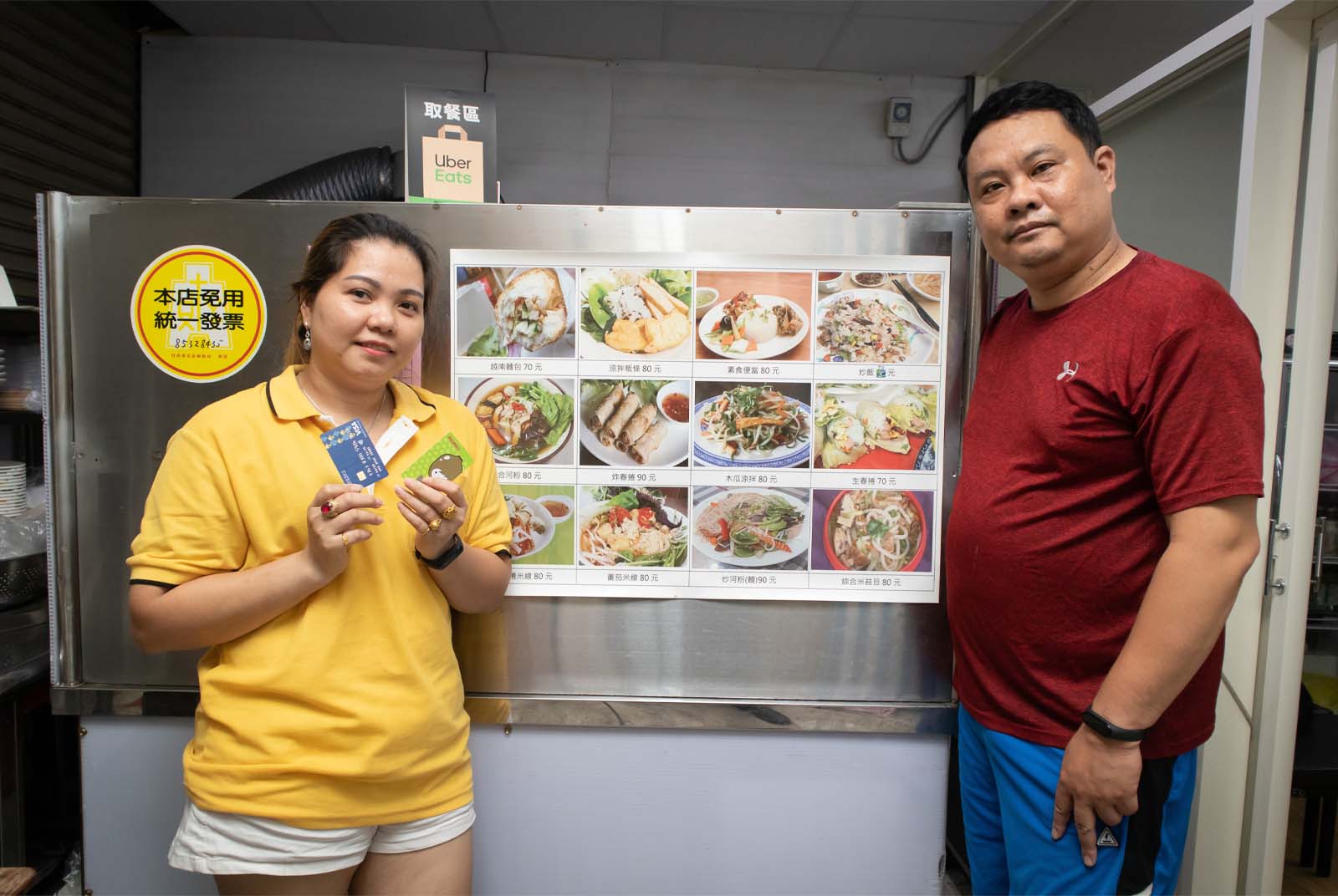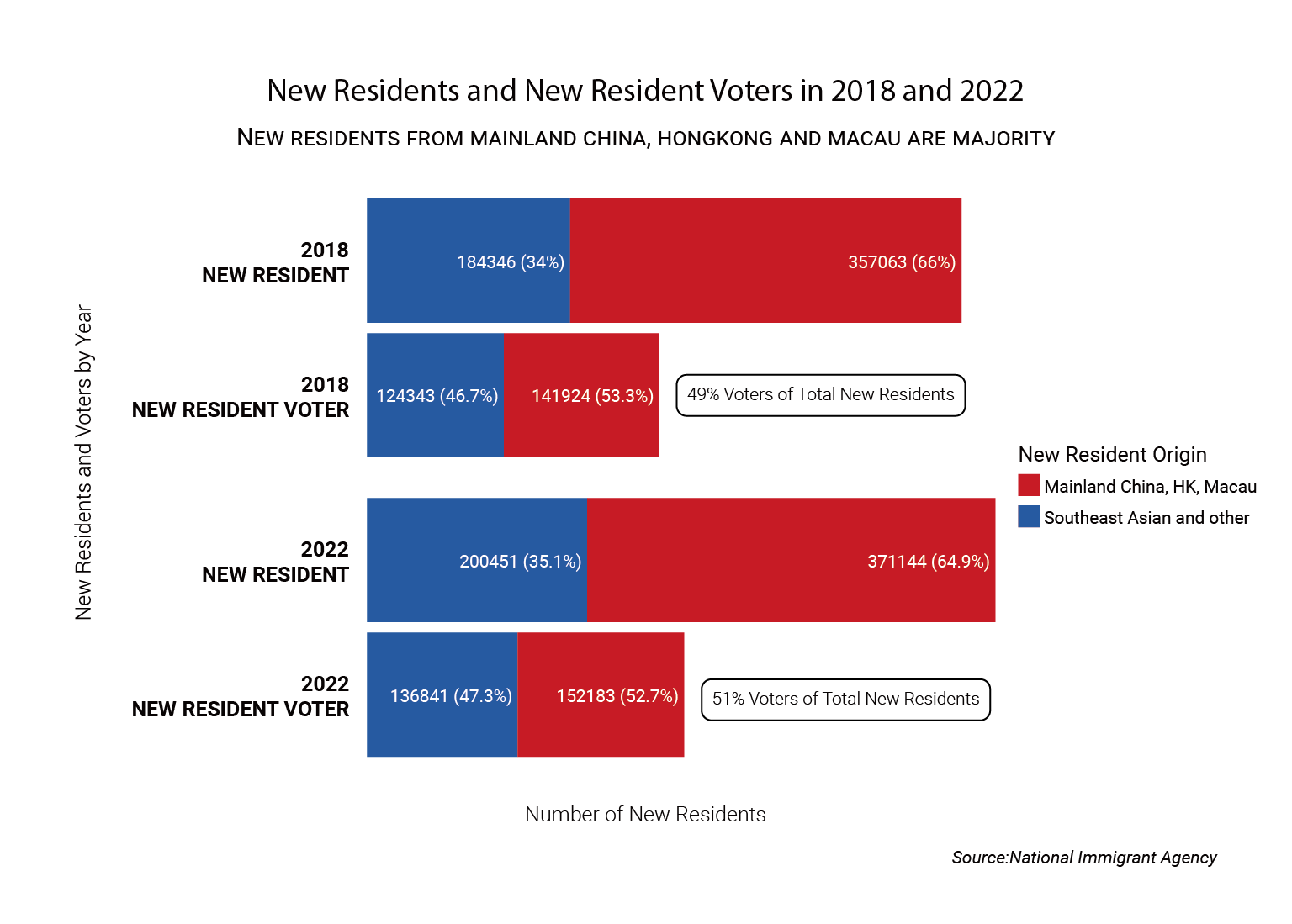The evolving role of immigration in Taiwan politics

Source:CommonWealth Magazine
Almost 300,000 immigrant voters in Taiwan play an essential role in affecting political planning. From the interest in immigration laws between parties to the results of the election, what are some changes we can see from 2018 to 2022?
Views
The evolving role of immigration in Taiwan politics
By Nguyen Huong Giang, Mananya Techalertkamolweb only
Establishing Annual Celebration of New Immigrant Day; Building an Immigrant Museum; Developing a New Immigrant Economy; Organizing an Independent Agency Responsible for New Immigrant Issues; Providing Health Care for Older Immigrants (CEC Bulletin 2022)
In the run-up to Nov 2022’s Taiwanese elections, politicians made a series of pledges to win the votes of New Residents, illustrating the evolving role of immigrants and immigration policy in Taiwanese politics.
571,595 New Residents, 289,024 Voters, and 1.5% of Total Voters
Up to now, Taiwan has 571,595 New Residents through marriage. About 65% of the New Residents come from Mainland China, Hong Kong, and Macau. The rest come from Southeast Asian countries and others. However, only half of the total New Residents have the right to vote.
Figure 1 :

Compared with 19.3 million voters eligible to cast ballots in the 2022 local elections, the 289,024 New Resident voters are a tiny fraction, accounting for just 1.5% of the overall voting population. While these New Residents are not large enough of a voting bloc to affect Taiwanese politics at a macro level, they can contribute to the success or failure of candidates in some local constituencies with large immigrant populations. Therefore, immigrants and immigration policy are receiving more attention from politicians as their numbers grow in some communities. For example, New Taipei City, Taoyuan, and Kaohsiung have the highest concentration of New Resident voters, with more than 30,000 people each. Five regions - New Taipei, Taoyuan, Taichung, Pingtung, and Lienchiang - have a ratio of more than 15% pro-immigrant candidates. Nantou and Chiayi have the highest ratio, with more than 20% of candidates considered pro-immigration.
Figure 2 :
Who and Which Party are More Interested in Immigrant Policy?
In 2022, the number of candidates proposing immigrant policy is slightly higher than in 2018, rising from 11.6% to 11.8% of all candidates. Immigration-oriented policy from candidates running for mayor has increased markedly, from 16.1% in 2018 to 22.5% in 2022. Almost all candidates from big cities spoke up for the immigrants, including the top three candidates in Taipei's mayoral race Chen Shih-chung (Democratic Progressive Party – DPP), Chiang Wan-an (Kuomintang - KMT), and Huang Shan-shan (Independent Candidate); New Taipei’s mayoral candidates Hou Yu-ih (KMT) and Lin Chia-lung (DPP); Taichung's mayoral candidate Tsai Chi-chang (DPP). Only Tainan's mayoral candidates did not propose a New Resident policy this year.
Figure 3:
Candidates from Taiwan's major parties, such as KMT and DPP, tend to seek the support of immigrants. KMT always has the highest percentage of candidates committing to immigrant policies, from 14.2% in 2018 to 16.3% in 2022. The reason for the KMT’s interest in immigration policy can be explained by about 65% of immigrants coming from China. The KMT has long promoted closer relations with China compared to other Taiwanese parties. Next, the DPP has increased the percentage of candidates committing to immigrant policies from 10.8% in 2018 to 12.2% in 2022. However, the DPP has focused more on the influx of immigrants from Southeast Asian countries, adhering to the New Southbound Policy under President Tsai Ing-wen. Both KMT and DPP supported immigrant politicians entering the Legislative Yuan.
Figure 4:
In addition, since most New Residents are female marriage migrants, the percentage of female candidates who care about immigrants has always been higher than male candidates across elections. However, this year, while the number of female candidates promising immigrant policies decreased, the number of male candidates increased slightly. The ratio of candidates proposing immigrant policy increased as the male candidates in the mayoral-level elections emphasized immigrant policy more. On the other hand, pro-immigrant female candidates grew from 75 in 2018 to 79 persons in 2022. However, the ratio marginally decreased because the total number of female candidates also rose from 499 in 2018 to 564 persons in 2022.
Figure 5:
From the Central to Local: Coherence and Consistency in Immigrant Policy
Overall, the commitments for immigrants in 2022 are similar to those in 2018, such as employment, education, culture, public service, etc. This year, commitments to employment and public services are mentioned more than in 2018, rising to 17.3% and 14.6% from 14.3% and 11.2%, respectively. For New Residents, jobs are a key issue because they can create economic independence and chances to connect with the community. In addition, local public services are not only viewed by immigrants as an opportunity to navigate Taiwan’s legal system, but also a bridge between New Residents and the immigrant community.
Figure 6:
In 2022, the most prominent commitment is socio-cultural integration, which aims to create a friendly environment for immigrants. It accounts for 21.6% of total commitments. But what is an inclusive environment for immigrants? Establishing an International Migrants Day? Organizing a Multicultural Week? Building a New Resident Cultural Park? Or Creating a one-stop New Resident service office?
Most of the policy commitments are unclear and similar to the Central Government's policies in fields such as education, employment, and health care. This raises the question about the coherence and consistency in policy approach between the Central Government and Local Governments.
Immigrants’ Voices and Result of the Election in 2022
Representing the Happy People Party (Party of New Residents) in Zhongliao – Caotun, the candidate promised to reduce barriers for New Residents to enter government agencies that assist with immigration matters to address education, economic, and employment issues more effectively. As a result, the candidate lost.
And 58.4% of candidates proposing immigrant policy won in the 2022 local election, which was more than 57.8% of candidates in 2018. This is a sign of Taiwanese society making efforts to welcome more immigrants and address their concerns as they become important constituencies in key local election races.
Figure 7:
About the project:
To provide insightful information about the 2022 Taiwan local election, the CommonWealth Magazine has collaborated with the International College of Innovation, National Chengchi University (NCCU), and the Election Study Center of NCCU, to open a Capstone course: Practice of Data Analysis. NCCU students from different countries collaborated in this course by employing their coding skills and political knowledge about Taiwan to produce data-driven stories about the 2022 Taiwan local elections.
The main instructor is Chung-pei Pien, Assistant Professor of International College of Innovation, NCCU (@pienici). Advisors include Nathan Batto, Associate Research Fellow, Institute of Political Science, Academia Sinica, Taiwan; Lev Nachman, Jointly Appointed Assistant Professor of International College of Innovation & International Doctoral Program in Asia-Pacific Studies, NCCU (@lnachman32); Eric Yu, Research Fellow, Election Study Center, NCCU; and Silva Shih, Managing Editor at Commonwealth Magazine (@silvashih). Morris Yang, Graduate Student of College of Communication at NCCU, is the teaching assistant. (@MorrisSHYang)
About the authors:
Mananya Techalertkamol 張曼娜, based out of Thailand, is a graduate student of Global Communication and Innovation Technology at Taiwan’s NCCU. She is passionate about Data Science | Marketing | Being A Generalist. @JeeMananya ,linkedin.com/in/jeemananya/
Nguyen Huong Giang 阮香江, from Vietnam, is a graduate Student of Global Communication and Innovation Technology at Taiwan’s NCCU.
She is passionate about Journalism | Culture | Mindfulness | Startup. @NgH_Giang ,linkedin.com/in/nhgiang/
Have you read?
- Above Any Label – A New Kind of Taiwanese
- New Immigrant Languages Added to List of Required Languages in Primary Schools - Why are Some Parents Up In Arms?
- Despite Verbal Support for Hong Kong, Why is Immigrating to Taiwan So Hard?
Uploaded by Ian Huang






